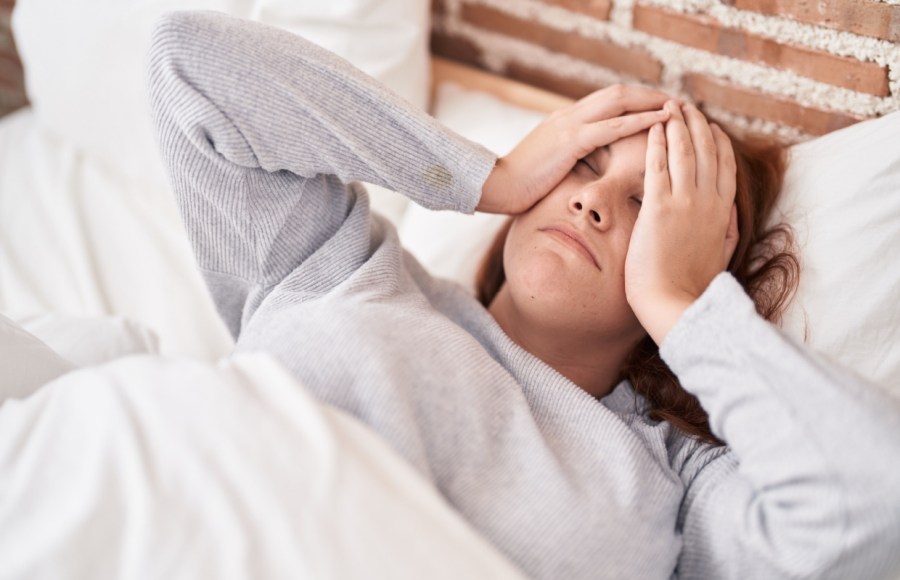
Alice Dogruyol explores the relationship between sleep and weight loss
Wondering whether your lack of sleep could be your healthy weight loss journey? Alice Dogruyol explores the relationship between sleep and weight loss, before sharing some top tips to sleep better and find your happy weight.
Welcome to Alice in Weight Loss Wonderland, where I invite you to jump with me down the rabbit hole of weight loss and fat burning strategies. In this article, I’m looking at how sleep and weight loss are connected, and how a lack of sleep can make you pile on the pounds.
Related: Ola Jordan’s weight loss journey: ‘I no longer recognised myself’
When weight gain becomes unhealthy
Before I go on, I want to make something clear: I do think big is beautiful; all bodies are beautiful. There are so many women that genuinely look and feel great in bigger bodies and I consider myself one of them. But for me, being too big sucks and the health implications are terrifying.
Whether we like it or not there is a tipping point when it comes to weight gain and health. The point is different for everyone. When fat cells become so swollen that they can’t take any more and the fat starts wrapping itself around your internal organs, clogging up your liver and intestines, health problems will inevitably follow.
Carrying a lot of excess weight is a heavy burden to live with, both physically and mentally, and anyone who claims otherwise is in denial and needs to wake up and do something about it.
Related: Can toxins prevent weight loss? How to detox & lose weight
The link between sleep and weight loss
Health experts often talk about the importance of getting good-quality sleep for a long list of reasons. Our circadian rhythm, or 24-hour sleep/wake cycle, dictates almost every aspect of our physiology and metabolism, including weight loss, so sleep and weight loss or gain are definitely connected.
I always notice that if I don’t get enough sleep, I wake up craving carbs and caffeine. I looked into why this might be and found an interesting study that revealed how sleep deprivation can cause hyperphagia, or extreme hunger. The study revealed that a lack of sleep decreases leptin levels – a protein produced by fat cells that is an appetite-regulating hormone – and elevates ghrelin levels – a peptide hormone, produced predominantly in the stomach, that increases appetite!
Lack of sleep also increases the stress hormone cortisol, which is secreted from the adrenal glands and enhances the production of glucose by the liver and promotes insulin resistance. Furthermore, this small study suggests that a lack of sleep can decrease fat loss considerably. They concluded that sleep curtailment decreased the proportion of weight lost as fat by 55%, which is a staggering amount.
I also know that the longer I spend in bed, or the earlier I go to bed, the less time I spend with my head in the fridge or kitchen cupboard looking for snacks! So, you can clearly see the chain of events and the link between sleep and weight loss, or gain in this instance. Therefore, it makes perfect sense to look at ways to improve your sleep quality, and subsequently aid you on your healthy weight loss journey.
Related: Is 432Hz frequency music good for sleep?

How to sleep better for improved weight loss
There are all sorts of practical things we can do to encourage a better night’s sleep, like use ear plugs if your partner snores like a foghorn, or even having separate bedrooms. You should also make sure your room is adequately dark and at a comfortable temperature. Of course, if you have young children you aren’t going to be able to guarantee a full night’s sleep. But there are a number of methods you can try to improve your sleep, and subsequently, your weight loss.
1. Eat earlier to lose weight
I am a huge fan of eating my last meal early on and I have noticed that it gives me better blood glucose control through the night, better sleep and it helps me to control my weight. It can be rather antisocial and hard to stick to, but the pay-off is worth it.
Eating your last meal or snack of the day before 6pm has been shown in so many studies to help burn fat while you sleep. Study findings show that blood sugar levels are higher, and the amount of fat burned lower, when eating a late dinner – even when people ate the same meal. The study found that late eaters had peak blood sugar levels almost 20 percent higher and fat burning reduced by 10 percent, compared with those who ate dinner earlier.
To support weight loss, eat your last meal of the day as early as possible to increase the fasting sleep window. This way, your body will be more likely to be burning fat rather than glucose as you sleep.
Related: Diabetes and weight loss: should I be skipping breakfast?
3. Avoid carbs later in the day (and refined carbs altogether)
Carbs are not the devil, but if you are going to eat them, have them at the start and middle of the day not at the end. The body turns carbs into glucose, which is the body’s preferred energy source. However, anything that you don’t use up gets stored in fat cells. So, if you eat carbs earlier in the day, you have more of a chance to burn off the glucose they generate.
You should also make a conscious effort to avoid refined carbs. Research carried out by Columbia University Irving Medical Center revealed that women who consumed a diet high in added sugars and refined carbohydrates had a greater risk of developing insomnia.
3. Cut your caffeine intake
Some people can metabolise caffeine quickly – some can’t. There is growing evidence to suggest that genetic factors play a role. This would explain why some people can have six cups of coffee a day or a coffee in the evening and have no problems falling asleep.
Coffee has some great benefits – it stimulates dopamine, the happy hormone and makes you feel more alert and is packed with antioxidants. But, it can also cause insomnia. For me, as a Type 1 diabetic, it also causes a little glucose spike. My best sleep comes, sadly, when I cut coffee and caffeine out of my diet completely. I notice that even one cup of coffee in the morning will impact my overall sleep quality.
If you’re struggling to get some shut-eye, try gradually cutting down your caffeine intake, or at least avoiding it after midday.
Related: Is chocolate healthy? 6 health benefits of eating chocolate
4. Aim to increase your basal metabolic rate
When we sleep, our bodies continue to utilise energy for essential bodily functions such as breathing, temperature regulation and cell growth and repair. The energy we use to just keep going is called our basal metabolic rate (BMR) and accounts for about 80% of our total calories burned in a day.
People that have more muscle have a higher BMR burn more calories. As a rule, the more muscle and less fat you have, the faster your metabolic rate. Variations in BMR may explain why two people following the same diet and activity levels may not have the same weight loss outcome.
If you want to burn more calories and lose weight while you sleep, you need to increase your basal metabolic rate. You can calculate your BMR here. It is important to note that our BMR is ruled by our thyroid, so it’s a good idea to speak to your GP and make sure your thyroid is working properly.
To increase your basal metabolic rate, try upping how much exercise you do. This doesn’t mean you need to train for a marathon – I hate running and jumping exercises, so I opt for resistance training, which is calm, controlled and really helps you to build up muscle while losing excess fat.
Discover how strength training can cut your type 2 diabetes risk
5. Get more deep sleep for healthy weight loss
As we sleep, our bodies produce human growth hormone (HGH). This important hormone is involved in many biological processes including being the main driver of cell repair, muscle growth and fat metabolism. It enhances the utilisation of fat by stimulating triglyceride breakdown and oxidation in adipocytes (fat cells).
Research by The Sleep Foundation shows that when we are in REM sleep, which is not deep and our brains are more active, we use glucose. Then, when we go into the deep sleep, this is when growth hormone is released and helps repair and maintain muscle mass and decrease fat mass. Try using the app ShutEye to track your sleep phases and amount of deep sleep.
TRY THIS: I always keep a bottle of Life Armour Drops of Slumber (£21.25) next to my bed and I don’t travel without it. I take quite a high dose – 2-3 full pipets directly under my tongue when I get into bed – but I always notice I have a better sleep as a result. It contains herbal ingredients including Zizyphus and Valerian Root and vitamin B6, which helps regulate levels of the sleep hormone melatonin. Best of all, I don’t feel any drowsiness when I wake up in the morning.
Read next: Lorraine Kelly on weight loss, wild swimming and menopause







